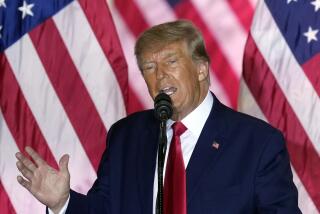9 Plead Not Guilty in KPMG Tax Case
- Share via
Eight former executives of accounting firm KPMG and one of its former lawyers pleaded not guilty in a tax shelter case Tuesday, while a U.S. prosecutor said he expected charges to be brought against 12 or more additional defendants.
Assistant U.S. Atty. Justin Weddle also told Manhattan federal Judge Lewis Kaplan at an arraignment hearing for the nine defendants currently in the case that additional counts were expected against some of them. Weddle said those charges, contained in a so-called superseding indictment, probably would relate to alleged tax evasion stemming from tax shelter transactions.
Weddle did not elaborate on the new defendants expected to be named.
The nine current defendants, including former KPMG Deputy Chairman Jeffrey Stein, were indicted last week on charges of conspiring to defraud the government in connection with tax shelters KPMG sold to wealthy individuals. A conviction on the conspiracy charge carries a maximum prison term of five years for each defendant.
The defendants were released on personal recognizance bonds Tuesday and agreed to travel restrictions.
The arraignments took place a week after KPMG agreed to pay $456 million to settle a three-year-long federal investigation of its sales of tax shelters, avoiding a criminal indictment that might have crippled the audit firm.
KPMG declined to comment Tuesday.
At the hearing, Weddle called Stein and former KPMG Vice Chairman Richard Smith “leaders of the fraud” and asked the judge to impose higher bail amounts on them as a condition of their release.
The judge ordered Stein to be released on a $3.5-million bond, while Smith was ordered to post a $1.5-million bond. The other defendants were released on bonds ranging from $300,000 to $1 million.
The government said last week that KPMG made $115 million in fees in a conspiracy that spanned from 1996 to 2003. The accounting firm generated at least $11 billion in fraudulent tax losses for wealthy individuals and prevented the government from collecting $2.5 billion in tax receipts, the Justice Department said.
More to Read
Inside the business of entertainment
The Wide Shot brings you news, analysis and insights on everything from streaming wars to production — and what it all means for the future.
You may occasionally receive promotional content from the Los Angeles Times.










